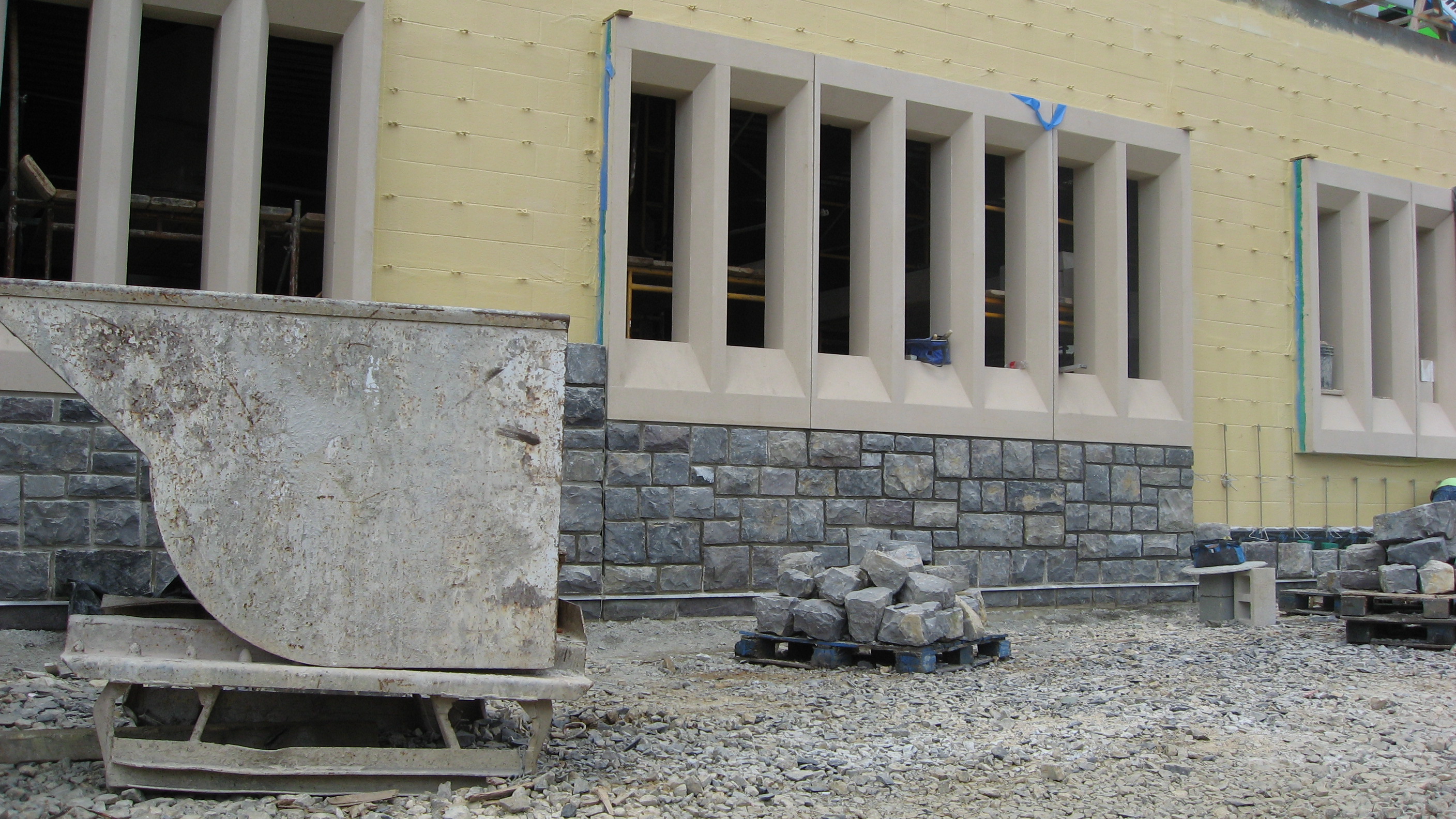First Hokie Stone set into Virginia Tech Carilion building facade

The Virginia Tech Carilion School of Medicine and Research Institute (VTC) passed a symbolic milestone recently with the placing of the first batch of Hokie Stones in the facade of the new VTC building.
Hokie Stone, a type of dolomite limestone, is the traditional building material used on Virginia Tech buildings. Most of the stones come from a 40-acre quarry located near the Virginia Tech central campus in Blacksburg, Va.
“This milestone is exciting because it is something that you can actually see – and in many ways it represents the partnership between Virginia Tech and Carilion Clinic,” states Dennis Dean, acting director of the Virginia Tech Carilion Research Institute. “We are carefully putting the pieces together to make VTC a reality. The partnership is impressive – people have already begun to collaborate on many levels.”
Workers are hand cutting the stones on the VTC construction site in Roanoke. Approximately 170 tons of Hokie Stone will be used to cover about 5,570 square feet along the entrance to the VTC building.
“Virginia Tech is my alma mater, so this project is especially important to me. Hokie Stone is a wonderful complement to the building, the visual appeal is obvious -- but it is the emotional appeal that really makes a strong statement. The Hokie Stone serves as a foundation to the main entrance of the building, which reflects the academic foundation that Virginia Tech envisions for the new institution.” states Daniel DiMarco, project architect at AECOM.
Research conducted at VTC creates a bridge between basic science research at Virginia Tech and clinical expertise at Carilion Clinic. Research conducted by scientists at the institute is aimed at understanding the molecular basis for health and disease, and development of diagnostic tools, treatments, and therapies that will contribute to the prevention and solution of existing and emerging problems in contemporary medicine.
In early June of this year, VTC’s four-year doctorate of medicine program received preliminary accreditation by the Liaison Committee on Medical Education (LCME) and in July the school received certification by Virginia’s State Council of Higher Education. Later this fall VTC will be seeking approval from the State Association of Colleges.
The school’s first class of 42 aspiring physicians will begin their studies in the fall of 2010 and graduate with an M.D. degree in the spring of 2014.
With an innovative patient-centered curriculum, VTC addresses the increasing need for research-competent physicians who can translate research from the bench to the bedside and into the community. The curriculum provides an exemplary education in basic sciences and clinical sciences and skills, but transcends the traditional medical education model by providing a solid foundation in, and opportunities to explore the disciplines of research and interprofessionalism.
The VTC physician will be well prepared to enter any area of medicine and will possess the skills needed to become part of an interdisciplinary team. VTC graduates will be thought leaders in their chosen field, whether it is community or academic medicine, research, health policy and reform, or health information technology.
The Virginia Tech Carilion School of Medicine and the Virginia Tech Carilion Research Institute comprise a unique partnership to establish a new generation of health care professionals and leaders in their chosen fields. Originating from the Carilion Clinic, one of Virginia's largest health care providers, and Virginia Tech, the commonwealth's leading research university, the school and institute will occupy the nexus of modern results-driven medical training with applications-oriented research.
Related Links
- Mark Greenawald named founding chair of Virginia Tech Carilion School of Medicine and Research Institute's Department of Family Medicine
- Virginia Tech Board of Visitors approves new Master of Public Health program
- Six new Virginia Tech Carilion research projects address infectious disease, develop medical technology




